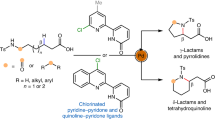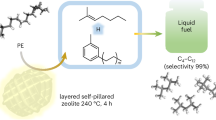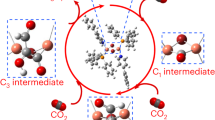Abstract
IN the interpretation of polarographic measurements, it is usually assumed that organic compounds are only reduced when they are adsorbed onto the surface of the mercury electrode1,2. Unfortunately, the term “adsorption” is used for a broad range of interactions between the solid and liquid phase.
This is a preview of subscription content, access via your institution
Access options
Subscribe to this journal
Receive 51 print issues and online access
$199.00 per year
only $3.90 per issue
Buy this article
- Purchase on Springer Link
- Instant access to full article PDF
Prices may be subject to local taxes which are calculated during checkout
Similar content being viewed by others
References
Majranovskii, S. G., Catalytic and Kinetic Waves in Polarography (Nauka, Moscow, 1966) (in Russian).
Tedoradze, C. A., Usp. Electrochim. Org. Soed., 23 (Nauka, Moscow, 1966).
Valenta, P., Chem. Zvesti, 8, 767 (1954).
Breyer, B., and Bauer, H. H., Alternating Current Polarography and Tensammetry (Interscience, New York, 1963).
Vettig, K., Elektrokhimiya, 3, 269 (1967).
Author information
Authors and Affiliations
Rights and permissions
About this article
Cite this article
ZUMAN, P., BARNES, D. Desorption of 3-Phenylpropionaldehyde preceding Polarographic Reduction. Nature 215, 1269–1270 (1967). https://doi.org/10.1038/2151269a0
Received:
Revised:
Issue Date:
DOI: https://doi.org/10.1038/2151269a0
Comments
By submitting a comment you agree to abide by our Terms and Community Guidelines. If you find something abusive or that does not comply with our terms or guidelines please flag it as inappropriate.



